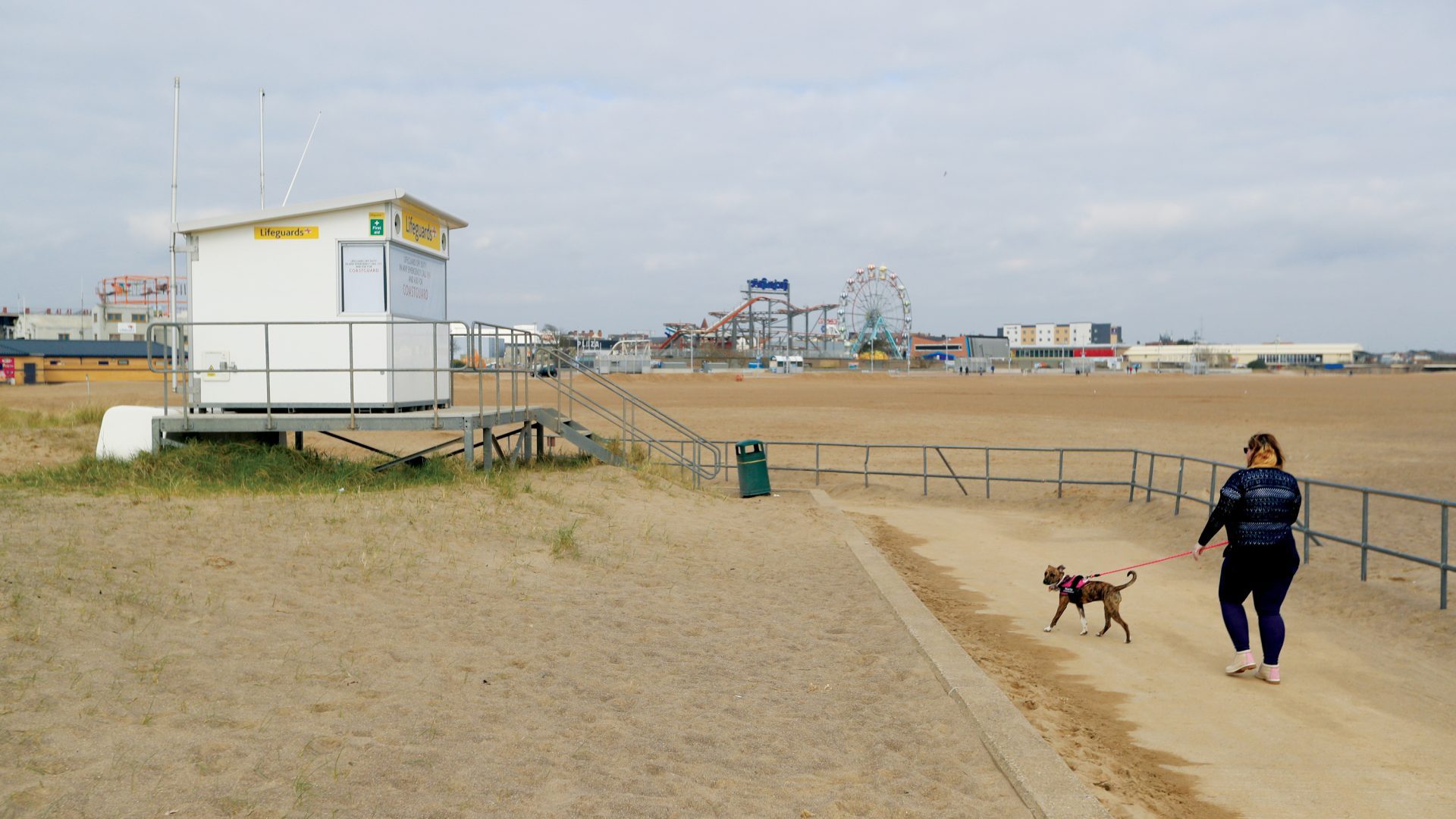Like Martin Fletcher, I returned last month to Skeggy after five years (“Wish EU were here”, TNE #316). I was born and bred on the council estate to a man who was the only Polish man in the town for 40 years – a demobbed airman who met my mum in a chip shop. It lasted 63 years.
Discrimination? I don’t think so. He was known as “Jonny the Pole”. Thirty years as chief mechanic on the lifeboat, and similar in charge of the illuminations, the town awarded him its highest honour, the solid silver Jolly Fisherman, proudly on my desk. With mum being the country’s first teaching assistant, our family was totally respected by the real folk of Skegness.
Could dad provide the “real hard-working people” of the Midlands with the bright lights today? No, the now faceless and remote East Lindsey Council, who don’t understand the seaside, scrapped them and built a Premier Inn in prime position next to the pier. It holed the town’s core business.
By and large the town had no idea of the merits of Brexit. No foresight of the departure of staff in cafes, or of the problem getting spare parts for the arcade. They were screaming for help and Johnsonian and Farageian messages seemed a panacea. Now my ex-council estate neighbour tells me they may have to close the family chip shop after 100 years. The slope is down. Why, when the entire sealine is covered in wind turbines, has the town not seen a single penny of benefit, no jobs or revenue?
Let’s renew the seaside towns as well as the energy. The odd levelling-up grant doesn’t cut it. Skeggy could reinvent itself. Bring back truly local government, enterprise investment, and the odd Jonny the Pole wouldn’t go amiss.
Paul Strzelecki
Cookham, Berkshire
I enjoyed reading the article filed from Skegness by Martin Fletcher, which serves to reinforce how so much of the Leave vote was secured by downright lying on the part of the Leave campaign. Also a feature of populists was to cast blame for various ills on to a particular group – in this case eastern Europeans. At least some people in the town now recognise the value of those departed workers.
Given that, it’s rather disappointing to see a reference to “illegal immigrants”. Seeking asylum is a legitimate human right, so an asylum seeker cannot, by definition, be “illegal”. This language plays into the hands of the populists and far right. Perhaps the term “irregular” to describe the route of entry would be better. It might also add to the case for the government making available safe (“regular”) routes for those wanting to come and claim asylum.
Dr Peter Lumsden
Lancashire
Tempting as it may be to indulge in an orgy of “We told you so” over Brexit, we can continue to be divided and be overwhelmed, or we can be generous and try to move on together.
Remain was not without sin either: arrogance about the initial referendum campaign, failure to make the trade-offs explicit – especially that if the whole point of Brexit was for regulatory divergence then for Ireland the different regulatory jurisdictions would have to meet SOMEWHERE – failure to carry out the most basic risk analysis.
We need leadership and a media climate where the country has the pull of a shared purpose to move on, rather than wasting resources on putdowns.
Ruth Tunnicliffe Wilson
I noted with sardonic amusement the view of the town councillors that it wasn’t Brexit that was at fault, but the government’s implementation of it.
Just like the Brexit politicians, Leave campaigners never accept responsibility for the problems caused by the very thing they campaigned so fervently for. Odd that.
Alexander Blackburn
Hemel Hempstead, Herts
Your article on Skegness and a letter under the heading ‘Switch Sides’ (in issue #315) prompted me to write concerning a neighbour who lives down the road from me – whom I get on with very well.
He voted Leave, primarily due to his experiences working as an instructor/ safety officer in a transport/logistics firm. His main concerns were that EU workers, coming to the UK under freedom of movement, were driving down wages in the industry and there were some issues of safety, as he felt training in some countries (primarily eastern European states) was of a lower standard.
A couple of weeks or so ago, he said given the vote now he would almost certainly vote Remain. He still had some concerns regarding the transport industry, but, and this is the big thing, he feels that NONE of the Brexit promises made have been fulfilled. He feels cheated by both the Leave campaigners and the government.
Dunton Greene
Europe bound
Re: “Brexit is like a tumour but the patient is in denial”, Letters, TNE #316.
The only leader consistently opposed to Brexit is Nicola Sturgeon. Unfortunately the English political establishment, Keir Starmer included, are too arrogant to listen to a mere Scot.
Which is why, very soon, we in Scotland will be on our way back into the EU as an independent member state. What the people of England then do is up to them, but in the absence of anything resembling sensible leadership, I have little hope for their future prospects.
Ian Anderson
Via Facebook
Unfortunately “Brexit” has become a toxic word for Labour because they recognise that in many of their constituencies, the Brexit vote was solely linked to a visceral hostility to immigration. It wouldn’t take much, for example in Leeds East, for Reform/ Ukip to easily unseat the sitting Labour MP. It’s been Labour for decades, but that will change in the blink of an eye – and Labour knows it.
John Henry
Via Facebook
What next?
As if things in this country are not bonkers enough already, along comes so-called captain of industry Lord Wolfson to say that this is not the Brexit he voted for. Well I can assure the boss of Next that it was certainly the Brexit I voted against. I wonder what he thought would be achieved by turning the UK into an unwelcoming, xenophobic country?
I wonder how he thought putting barriers up to our largest and closest market would help importers and exporters?
Another thing I wonder is how he progressed from running anything more complex than a jumble sale?
Robert Boston
Kingshill, Kent
Human rites
Re: “Remembrance revisited”, TNE #316. We should look at why the Church of England sets the content and order of service for the act of remembrance. We need a humanist service reflecting that the horror and outrage of war is entirely man-made and that we have to save ourselves.
Kathryn Ball
Deadly growth
I was surprised that Diane Coyle’s article “The end of growth” (TNE #316) made no reference to the climate in the shocks and crises that have hit expectations about economic growth.
What faces us all, planet-wide, is not how we restore growth, with its greedy appetite for the resources that keep the Earth habitable; it is how we find ways to move on when the economic imperatives we have been told are “truths” are fuelling the accelerating collapse of the biosphere we and all other species are dependent on for survival.
It’s November today in Snowdonia and the temperature is forecast to rise to 18C and not drop tonight below 12C. There have been no frosts this “winter”. That is why a managed route away from current dogmas about economic growth is urgent over everything else.
Chris Clode
Wrexham, Wales
Moving read
I just want to say thanks to Charlie Connelly for his beautiful, powerful letter to Suella Braverman, with its very well selected recommendations for her to read (TNE # 316). As a piece of writing I found it very moving (as well as mischievous), and I felt it exemplified the distinctiveness of TNE as a newspaper.
Over the last few years I have time and again asked in bewildered exasperation: do any of our politicians actually read? Or do we have a situation where we readers read more widely, more deeply and more purposively than our political representatives? Because we are receptive to the lives and minds and imaginations of others, and are willing to risk the challenge of those encounters.
At its best, reading (and writing) is a personal and political act of courage and adventure: a daring sharing. Thanks for reminding us of that with your selected recommendations.
Val Walsh
Crosby, Liverpool
A suitable candidate for Suella’s reading list would be Bloody Foreigners by Robert Winder – this ironic title is given to an account of immigration to these islands over the ages and the reception they received. The rest of the ERG would benefit from a copy, too.
Peter Stibbard
Tonbridge, Kent
I loved the Suella Braverman reading list, but I’m afraid that many of my near neighbours in the Dover area regard her as something of a heroine! Many East Kent families have willingly taken in genuine refugees, but can you imagine the feelings of those Dovorians struggling to pay rent and relying on food banks when they see boatloads of smartly dressed young Albanian men being given free accommodation and food?
As the son of two Commonwealth citizens who came to the UK in the 1950s, I sympathise with anyone wishing to do the same, but it’s quite obvious that many are not genuine refugees, and the current situation puts migrants’ lives in danger and strains the resources of East Kent, not least the brave volunteers of our local RNLI.
Of course, had the UK signed up to the Schengen Agreement, none of this would have happened. People would not have risked their lives trying to cross the Channel and people smugglers would not have been able to rid them of their savings. There would not have been the same pressure on East Kent, as many people would have travelled into the country by air, rail and other means and would have been detained by local authorities elsewhere in the UK.
My dearest wish is for the UK to rejoin the EU at the earliest opportunity, but the way to change opinions in East Kent is not to shout “all migrants are welcome and anyone who says otherwise is a racist”, but to persuade local residents that the best way to deal with migration is by working together and forging a common policy with other countries in Europe.
Robert Sissons
Folkestone, Kent
Pension poverty
International comparisons of pensions (WideAngle, TNE #316) are difficult because pension schemes are structured quite differently in different countries.
They vary in how entitlements are created, and whether the scheme pays the same to everyone with the same years of credit, or is based on previous earnings. More importantly, they differ in the balance between state, occupational and private pensions. The UK has an unusually high dependence on occupational and private pensions, which constitute nearly half of pensioner incomes.
If you are lucky enough to work for an employer who still has a generous occupational pension scheme, or you have managed to save in a private pension, you can be as prosperous as your European counterpart, or even more so. If you are dependent on the state pension alone, that is certainly not the case. Abandoning the triple lock will hit those in the latter group hard, while the former will probably remain relatively protected.
Not surprising for a country which is unusually unequal, but regrettable nonetheless.
Stephen McNair
Coltishall, Norfolk



